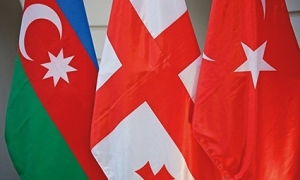Calls to Raise the Status of the Trilateral Partnership
Aconference under the title “Azerbaijan-Georgia-Turkey: Global and Regional Determinants of Trilateral Cooperation” was held last week in Tbilisi. This was the fifth consecutive event on trilateralism in the South Caucasus.
A number of interesting points were proposed on the nascent deep cooperation between Turkey, Georgia and Azerbaijan. All the participants at the conference agreed that the generally unstable region drives the three countries towards working with each other. Among them is the instability caused by separatism and international terrorism. Russia also played a role in the discussion. Moscow’s drive in the South Caucasus is of primary interest to the members of the trilateral partnership as all three have extensive economic and some military cooperation.
Turkey’s view at the conference was to point out how well customs works between Georgia and Turkey. It was also stressed that from a long-term geopolitical perspective, Turkey-Georgia-Azerbaijan cooperation will aggravate Armenia’s position as the latter will continue missing out on Caspian-Black Sea regional projects. This will inevitably lead to the further isolation of Armenia and continued dependence on Russia.
The Georgian experts were unanimous in stressing the need for the trilateral cooperation needs to be developed, claiming it falls short of being a fully-fledged alliance. They noted that the most viable way to move in that direction is to establish a trilateral council for strategic cooperation.
Durability of the Trilateralism
Over the past several years, since the trilateral cooperation was first introduced in May 2012 in Batumi, engagement between the three countries has increased. The trilateral partnership is altogether noteworthy as is consists of NATO member and EU-hopeful Turkey, EU/NATO-oriented Georgia, and Azerbaijan, which up until now has avoided joining any large economic or military alliances.
However, despite the three countries’ evidently divergent foreign policy paths, the basis for trilateral cooperation has only increased. Every country of the three needs the others. Turkey wants a more stable Georgia with deeper economic and energy relations, while Azerbaijan, in the light of uncertainties regarding Nagorno Karabakh, needs Turkey’s backing. Georgia, in between, under pressure from Russia and dependent on transit, in turn needs both Turkey and Azerbaijan. Moreover, the two countries are Tbilisi’s biggest trade partners and investment sources.
The trilateral cooperation between Turkey, Georgia and Azerbaijan seems to be based on mutual interests and geopolitical challenges. The countries are less concerned with different religions, foreign policy vectors, etc. All three see how interdependent they are and there are clear imperatives (internal problems, foreign pressure) to increase the cooperation within the format.
From a global perspective, the trilateral cooperation helps to link two important regions: the Black and Caspian basins. To make the argument clearer, the two regions were connected before, but this was never possible to do without Russian consent. The Nobel brothers in the late 19th century managed to export Baku oil through Georgia’s Black Sea ports and their geopolitical view of the South Caucasus could be regarded as a herald to what Turkey-Georgia-Azerbaijan are witnessing nowadays – reconnecting the Caspian with the Black Sea.
Geography and common geopolitical challenges drive the three countries together and these imperatives make the trilateral partnership a long-lasting one.
By Emil Avdaliani











